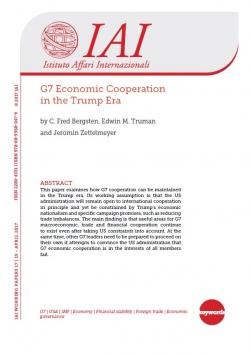G7 Economic Cooperation in the Trump Era
This paper examines how G7 cooperation can be maintained in the Trump era. Its working assumption is that the US administration will remain open to international cooperation in principle and yet be constrained by Trump’s economic nationalism and specific campaign promises, such as reducing trade imbalances. The main finding is that useful areas for G7 macroeconomic, trade and financial cooperation continue to exist even after taking US constraints into account. At the same time, other G7 leaders need to be prepared to proceed on their own if attempts to convince the US administration that G7 economic cooperation is in the interests of all members fail.
Paper presented at the international conference on “Major Challenges for Global Macroeconomic Stability. The Role of the G7”, organized in Rome on 27-28 March 2017 by the Istituto Affari Internazionali (IAI) with the support of the Italian Ministry of Foreign Affairs and International Cooperation and the Bank of Italy.
-
Details
Roma, IAI, April 2017, 16 p. -
Issue
17|19 -
ISBN/ISSN/DOI:
978-88-9368-047-9
Introduction
1. Macroeconomic and tax policy
1.1 Coordination options
2. Trade policy
2.1 A “better trade agenda”
2.2 Direct responses to the anti-trade backlash
3. Global financial stability
3.1 Crisis prevention
3.2 Crisis management
Conclusions
References



